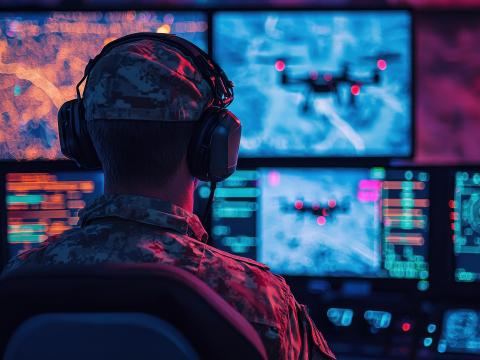Today's Hot Topics: Interoperability and Acquisition, Coalition-Style
The final panel of the 2010 Joint Warfighting Conference focused on two topics that have been discussed consistently for more than a decade: lack of interoperability and convoluted acquisition. Though the panelists agreed on the problems, their opinions about solutions differed slightly.
The final panel of the 2010 Joint Warfighting Conference focused on two topics that have been discussed consistently for more than a decade: lack of interoperability and convoluted acquisition. Though the panelists agreed on the problems, their opinions about solutions differed slightly. Vago Muradian, panel moderater, opened the discussion stating that the need to improve interoperability has been at the heart of the last two administrations and remains a priority in the Obama administration. One topic of particular interest to members of industry in the audience concerned changing import/export rules. Muradian believes that changes to these policies would help ensure interoperability. "Those who are willing to fight and die together should be allowed/willing to share information via interoperable equipment," he stated. Dr. A. Wayne Meeks, executive director, DASN Ships, Office of the Assistant Secretary of the Navy, argued that currently interoperability is a matter of mitigating problems. "We find out systems are not interoperable when it doesn't work rather than paying attention to interoperability in the testing and fielding stage," Meeks stated. One of the problems of aiming at interoperability earlier in the process is the definition of interoperability itself. The broad definition is facilitating the exchange of information. However, now means changing information between systems and platforms as well as across broad geographic expanses. Systems are expected to perform as if all of them have been engineered together into some super system. "That's not how we buy them and therein lies the problem," he noted. Jeffery P. Bialos, partner, Sutherland Asbill and Brennan, LLP, stated that despite overall, overpowering agreement that coalition warfare is here to stay, not much has been done to make this easier in interoperability and acquisition. Coalition operations are under-planned and under-funded. Speaking to his fellow panelists, Bialos said "You tell me the person at the Pentagon who is in charge of interoperability. I don't know that anyone can name that person. I don't think there is a person." Bialos continued that "in the 21st century, it's not about platforms or weapons. It's about network-enabled capabilities." This creates a spectrum of opportunity that in some cases have been successful, including blue force tracking. What should be done about this? "There is no panacea, no band-aid, but one: Put someone in charge whose focus is on enhancing coalition warfare. Two: develop coalition interoperability plans. Three: provide data to some of our coalition partners now," Bialos stated. He agrees that some of this is going on now, but there is still a need to work with EU on coalition training, and national export control needs to be reformed. Representing the congressional view, Valerie Bailey Grasso, specialist, Defense Acquisition Policy, Congressional Research Service, called for improvements in education and the work force. Reductions in the number of acquisition specialists as a result of congressional actions in the 1990s has left the vocation stripped of the experts it now requires. Congress recently moved to fix this problem by authorizing the hiring of several thousand purchasing personnel. Grasso revealed that her organization took a long hard look at the acquisition problems now occurring in the military. It concluded that while the military talks about jointness, acquisition still occurs on a service level. One "nuclear solution" to this problem is to create a joint organization that is responsible for acquisition for all of the services. It is not the intent of the Congressional Research Service to propose this solution, however, because it believes the armed forces can work out the problems on their own before taking this step becomes necessary.




Comments